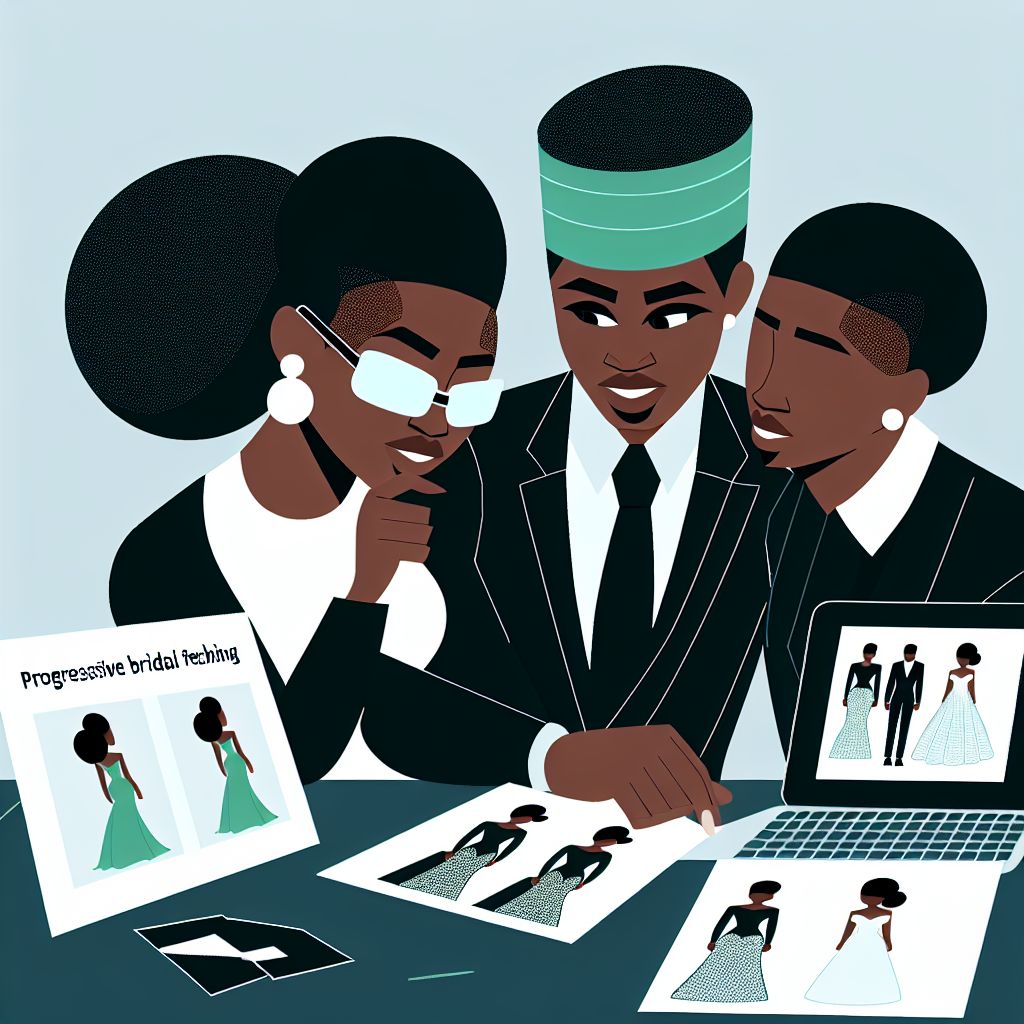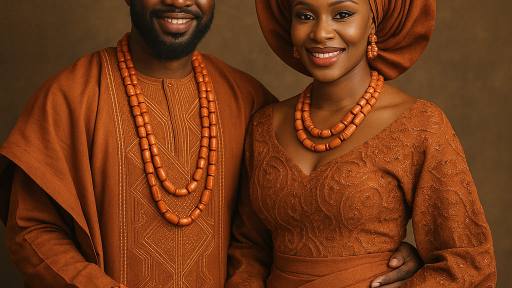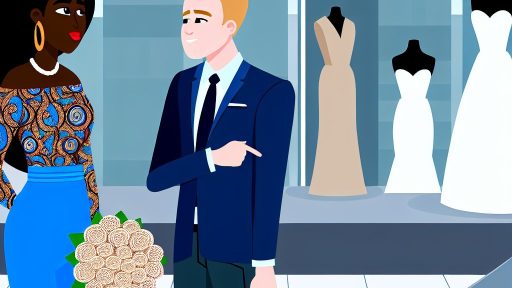Historical Overview of Traditional Nigerian Bridal Attire
Roots in Cultural Heritage
Nigerian bridal attire reflects the rich cultural heritage of diverse ethnic groups.
Each tribe, such as Yoruba, Igbo, and Hausa, has unique traditional wedding clothing.
These attires symbolize the bride’s identity and family history profoundly.
Moreover, they represent social status and community pride during wedding ceremonies.
Distinctive Elements of Traditional Attire
Traditional bridal outfits showcase vibrant colors and elaborate embroidery.
Fabric choices commonly include Aso Oke, George, and Ankara textiles.
Typically, brides wear matching headwraps, known as gele among the Yoruba people.
Additionally, accessories like coral beads and gold jewelry complement the look.
Significance of Fabrics and Colors
Each fabric holds cultural significance and often conveys symbolic meanings.
Red often represents vitality and prosperity, while white denotes purity.
For instance, the Igbo bride traditionally wears a red wrapper with beads.
Meanwhile, the Hausa community prefers dyed leather and embroidered robes.
Traditional Bridal Dressing Rituals
Dressing the bride involves family members and skilled attendants.
These rituals are deeply rooted in customs, ensuring respect and blessings.
Furthermore, the process strengthens bonds between families and communities.
The attire preparation marks the beginning of marriage celebrations across Nigeria.
Evolution Before Modern Influences
Before modernization, bridal attire remained closely tied to cultural norms.
Handwoven fabrics and natural dyes characterized early ceremonial clothing.
Since then, techniques passed down generations kept traditions alive.
Nevertheless, artisans adapted designs to reflect changing tastes and occasions.
Influence of Ethnic Diversity on Nigerian Bridal Fashion
Rich Cultural Tapestry of Nigeria
Nigeria hosts over 250 ethnic groups.
Each ethnic group has vibrant cultural identities.
This diversity impacts many aspects of life.
Bridal fashion reflects these unique cultural influences.
Attire showcases unique traditions, colors, and designs.
For example, Yoruba, Igbo, and Hausa-Fulani groups display distinct wedding styles.
Understanding these influences helps appreciate Nigerian bridal fashion variety.
Yoruba Bridal Traditions and Style
Yoruba people emphasize intricate fabrics like Aso Oke for bridal wear.
The brides wear artfully tied head ties called Gele.
Coral beads and elaborate accessories complement bridal outfits.
These elements symbolize royalty, prosperity, and cultural pride.
Igbo Bridal Fashion and Symbolism
Igbo brides often wear vibrant wrappers and blouses in red or white shades.
Beaded necklaces and wristbands enhance the traditional look.
This attire represents purity, strength, and community connection.
Distinctive headpieces such as the red cap or “Okpu Agwu” carry added meaning.
Hausa-Fulani Bridal Attire and Heritage
Hausa-Fulani brides prefer flowing gowns with elaborate embroidery called “Babban Riga.”
They accentuate their look with veils and fine jewelry.
Patterns and colors express social status and cultural heritage.
Fabric choices demonstrate craftsmanship passed through generations.
Inter-ethnic Influences and Modern Adaptations
Modern Nigerian bridal fashion embraces elements from multiple ethnic groups.
Designers like Ifeanyi Nwosu and Amina Bello blend traditional and contemporary styles.
This fusion creates unique fashion statements appealing nationwide.
Brides customize their looks by combining fabrics and accessories.
Such creativity celebrates Nigeria’s ethnic diversity and evolving fashion landscape.
Role of Ethnic Diversity in Bridal Fashion Businesses
Many bridal fashion companies tailor collections to ethnic markets.
Bella Ajayi Couture focuses on Yoruba and Igbo bridal designs.
Zainab Modest Styles caters to Hausa-Fulani traditional wear.
These businesses preserve cultural heritage through bridal fashion.
They also boost local economies by promoting indigenous craftsmanship.
Cultural Festivals and Bridal Fashion Inspiration
Annual events like Lagos Fashion and Design Week showcase ethnic bridal styles.
Weddings across regions inspire designers with authentic cultural motifs.
These platforms encourage innovation while honoring ethnic roots.
They foster cross-cultural appreciation among diverse Nigerian communities.
Role of Indigenous Fabrics in Bridal Wear
The Significance of Aso Oke
Aso Oke stands as a hallmark of Yoruba bridal fashion.
Its rich handwoven texture adds elegance and tradition to bridal attire.
Brides appreciate its durability and vibrant colors.
Many designers, like Tunde Balogun, incorporate Aso Oke in modern bridal gowns.
Consequently, it symbolizes cultural pride and timeless beauty.
Ankara’s Versatility in Wedding Attire
Ankara fabric captivates with bold, colorful prints and patterns.
This fabric allows brides to express individuality and creativity effectively.
Designers such as Adaobi Eze skillfully blend Ankara with contemporary styles.
This fusion highlights the richness of Nigerian heritage in bridal fashion.
Additionally, Ankara represents unity across diverse Nigerian ethnic groups.
Combining Tradition with Modernity
Bridal fashion frequently merges Aso Oke and Ankara for a unique look.
Designers like Ifeoma Chukwu craft outfits that respect tradition and follow trends.
These combinations create stunning, meaningful ensembles celebrated nationwide.
This approach increases fabric appeal among younger brides.
Ultimately, indigenous fabrics remain essential in today’s bridal wear evolution.
Impact on Nigerian Bridal Culture
Indigenous fabrics foster a strong connection to cultural roots.
They promote local artisans and traditional weaving industries.
Many brides choose these textiles to honor family heritage and identity.
Furthermore, the use of Aso Oke and Ankara inspires global appreciation.
Therefore, they sustain Nigerian bridal fashion’s relevance and vibrancy.
Find Out More: Incorporating Traditional Accessories into Nigerian Wedding Looks
Impact of Colonialism and Western Fashion on Nigerian Brides
Introduction of Western Styles
During the colonial era, British influence reshaped many aspects of Nigerian society.
Western fashion became increasingly visible in urban areas among the elite class.
Consequently, Nigerian brides started blending traditional attire with Western wedding dresses.
Christian missionary weddings introduced white gowns as symbols of purity and modernity.
For example, bride Adetola Fashola wore a Western-style wedding dress in Lagos in the 1940s.
Transformation of Traditional Bridal Attire
Colonialism and Western fashion did not entirely replace indigenous bridal styles.
Instead, they led to creative fusions of fabrics, designs, and accessories.
Nigerian brides began wearing lace and silk materials while preserving cultural motifs.
Many added veils and gloves, borrowed from Western wedding customs, to their outfits.
Meanwhile, local tailors like Chidinma Okeke adapted traditional head wraps into more elaborate forms.
Influence on Bridal Celebrations
Western impact extended beyond fashion to wedding ceremonies themselves.
Many urban couples adopted church settings and formal receptions.
However, indigenous customs such as the Igbo traditional wine-carrying ceremony continued.
Furthermore, some families combined both Western-style banquets and traditional festivities.
Event planner Adebayo Salako pioneered blending these practices in the 1970s.
Contemporary Reinterpretations of Bridal Fashion
Today, Nigerian brides often choose designs representing both heritage and global trends.
Fashion houses like Eleganza Bridal in Abuja promote this hybrid style approach.
Designers incorporate Ankara fabrics with Western cuts and embellishments.
Thus, brides like Nkechi Emeka showcase gowns celebrating cultural identity and modern elegance.
Therefore, the legacy of colonialism and Western fashion remains visible but transformed.
Uncover the Details: How Fabric Choice Reflects Status in Nigerian Weddings
Evolution of Bridal Accessories and Jewelry in Nigeria
Traditional Beginnings of Bridal Adornments
Bridal accessories in Nigeria have deep cultural roots that vary by ethnic group.
Historically, brides wore beads made from natural materials like coral and seeds.
For example, the Edo people used bright red coral beads to symbolize royalty and status.
Likewise, the Yoruba bride often embellished herself with handcrafted beads called ileke.
These traditional pieces conveyed wealth, family heritage, and spiritual protection.
Moreover, headpieces such as gele and intricately designed crowns were central to bridal attire.
Influence of Colonial and Global Trends
Colonial interactions introduced new materials like gold, silver, and costume jewelry.
Consequently, Nigerian brides began blending traditional beads with imported metals and stones.
Designers like Amaka Okoye embraced these changes to create fusion bridal sets.
Additionally, Western-style accessories such as veils and diamond rings became popular.
This blend of old and new exemplifies the adaptability of Nigerian bridal fashion.
Furthermore, international exhibitions in Lagos showcased modern bridal jewelry trends.
Modern Innovations and Designer Impact
Today, Nigerian bridal jewelry reflects a mix of cultural pride and contemporary style.
Designers like Kemi Ajayi craft bespoke jewelry incorporating precious gems with traditional motifs.
Technology allows for intricate 3D-printed designs that were once impossible to produce.
Popular pieces now include statement necklaces, chandelier earrings, and layered bangles.
Moreover, brides often customize accessories to narrate personal and family stories.
Exclusive bridal collections by brands such as Amokeh Styles highlight Nigerian artistry.
Popular Types of Bridal Jewelry Across Regions
- Beads: Coral and glass beads remain prized in the Niger Delta and Edo regions.
- Gold Chains and Necklaces: Widely favored among Yoruba and Hausa brides for elegance.
- Handcrafted Bracelets: Known as “ulu” in Igbo culture, symbolizing unity.
- Headpieces: Gele and ornate hairpins are essential for completing the bridal look.
- Earrings: Often large and elaborate, reflecting both tradition and modern preferences.
Cultural Significance and Symbolism of Bridal Jewelry
Bridal accessories serve as more than decoration; they convey social status and blessings.
In many communities, jewelry symbolizes fertility, wealth, and protection from evil spirits.
For instance, coral beads often indicate the bride’s noble lineage and family honor.
Each piece typically carries unique meanings passed down through generations.
Therefore, jewelry plays a vital role in storytelling within Nigerian weddings.
It transforms the bridal outfit into a rich cultural expression.
Learn More: Symbolism in Nigerian Bridal Fashion: What Every Bride Should Know
Modern Trends Blending Traditional and Contemporary Styles
Integration of Cultural Heritage with Modern Designs
Nigerian bridal fashion now beautifully combines rich cultural heritage with innovative designs.
This fusion allows brides to honor their roots while embracing current global trends.
Designers like Amaka Eze and Tunde Oladipo lead this creative movement.
They skillfully incorporate traditional fabrics such as Ankara and Aso Oke.
Moreover, modern silhouettes and intricate detailing enhance the overall appeal.
This blend makes bridal attire both unique and meaningful.
Popular Elements in Contemporary Nigerian Bridal Wear
Several elements define the modern Nigerian bridal look today.
First, mixing lace with traditional fabric adds elegance and texture.
Secondly, bold headpieces such as gele remain prominent accessories.
Additionally, customized embroidery featuring symbolic patterns enrich dresses.
Another trend involves using vibrant color palettes beyond classic white.
Brides often choose striking reds, blues, and golds to celebrate their identity.
Furthermore, designers focus on comfort by combining style with wearability.
Celebrated Designers and Influences
Cherished bridal fashion houses like Amara Nwosu and Ifeoma Chukwu innovate continuously.
They draw inspiration from both local traditions and international couture.
For instance, Ifeoma Chukwu’s 2024 collection highlights fusion gowns.
This collection featured flowing capes paired with traditional head ties.
Meanwhile, Amara Nwosu’s bridal range emphasizes sustainable and handcrafted materials.
These efforts resonate well with modern brides seeking authenticity and style.
Emerging Accessories and Styling Trends
Accessories now complement Nigerian bridal fashion with striking impact.
Elegant jewelry crafted by Ebuka Chima includes coral beads and pearls.
Also, makeup artists like Amaka Onwu incorporate contemporary looks with cultural motifs.
Hairstyling blends braids with modern updos to complete the ensemble.
Besides, brides personalize their outfits using custom sashes and fabric prints.
Such details create memorable and personalized wedding experiences.
Wedding Celebrations Reflecting this Fashion Evolution
Modern Nigerian weddings celebrate this blend through diverse ceremonies.
Traditional engagement attire merges seamlessly with reception gowns.
Event planners like Chika Obi design themes that harmonize style and tradition.
Music, décor, and fashion all create cohesive cultural storytelling.
Thus, bridal fashion becomes a vital expression of evolving identities.
See Related Content: How Grooms Are Redefining Nigerian Wedding Fashion

The Role of Nigerian Bridal Fashion in Cultural Identity and Expression
Cultural Significance of Bridal Attire
Nigerian bridal fashion holds deep cultural importance across diverse ethnic groups.
It reflects each community’s history, values, and traditional beliefs.
Moreover, bridal garments often signify social status and family heritage.
Families express pride by choosing attire that honors their lineage.
Consequently, wedding outfits become a visual story of identity and belonging.
Expression through Fabrics and Styles
Distinctive fabrics like Ankara, Aso Oke, and George carry symbolic meanings.
Designers use vibrant colors to convey emotions such as joy, prosperity, and unity.
Likewise, elaborate beadwork and embroidery showcase craftsmanship and creativity.
Through these elements, brides express personal style while honoring tradition.
Therefore, attire transcends fashion to become a form of cultural communication.
Symbolism in Accessories and Headgear
Accessories like coral beads and gold jewelry symbolize wealth and spirituality.
Headgear styles such as the gele or Igbo Ukhu communicate ethnic identity and respect.
These items complete the bridal ensemble, enhancing both beauty and meaning.
In addition, they connect brides to ancestors and their cultural legacy.
Hence, such adornments enrich the cultural narrative told through bridal fashion.
Bridal Fashion as a Platform for Cultural Preservation
Traditional bridal attire helps preserve indigenous crafts and textile arts.
Designers like Adeola Balogun and Chukwudi Anozie innovate while respecting cultural roots.
They blend modern trends with classic designs to keep traditions alive.
Wedding ceremonies become showcases of cultural education and pride.
As a result, bridal fashion strengthens community ties and cultural continuity.
Influence of Nigerian Celebrities and Fashion Designers on Bridal Trends
Role of Nigerian Celebrities in Shaping Bridal Fashion
Nigerian celebrities actively set trends through their wedding choices.
They influence many brides with traditional and contemporary styles.
For example, actress Genevieve Nnaji’s wedding look sparked interest in lace.
Embroidery trends also grew following her public appearances.
Musicians like Davido have influenced vibrant aso-ebi color schemes.
Their social media presence amplifies these bridal fashion trends widely.
Many fans and brides across Nigeria emulate celebrity bridal styles enthusiastically.
Impact of Fashion Designers on Modern Nigerian Bridal Wear
Renowned Nigerian designers redefine bridal fashion by blending tradition with innovation.
Designers such as Lisa Folawiyo combine indigenous fabrics with contemporary cuts.
This fusion attracts brides seeking unique and culturally relevant attire.
Maki Oh’s designs highlight artisanal craftsmanship and Nigerian heritage.
Designers like Deola Sagoe have gained international acclaim for their bridal collections.
They showcase their creations at Lagos Fashion Week and global platforms.
Their influence elevates Nigerian bridal fashion on the world stage.
Popular Bridal Trends Inspired by Celebrities and Designers
- Bold and colorful aso-ebi ensembles that celebrate unity and festivity.
- Intricate beadwork and embroidery showcased on statement gowns and accessories.
- Modernized traditional fabrics like Ankara and Adire used in elegant silhouettes.
- Mix of Western bridal gowns with Nigerian head-ties and gele styles.
- Personalized bridal looks emphasizing individuality and cultural pride.
These trends continue to evolve as celebrities and designers inspire new bridal aesthetics.
Collaborations Between Celebrities and Designers to Shape Bridal Fashion
Partnerships between Nigerian celebrities and fashion designers further shape bridal trends.
Many celebrities commission bespoke wedding dresses to showcase designer talents.
This mutually beneficial relationship increases designers’ visibility significantly.
It also provides celebrities with distinctive looks that capture public admiration.
As a result, these collaborations drive innovation within the bridal fashion industry.
Regional Variations in Bridal Fashion Across Nigeria
Northern Nigeria
Northern Nigerian bridal fashion features vibrant and intricate embroidery.
Brides often wear richly decorated robes called “Babban Riga.”
Additionally, elaborate headwraps known as “Turban” are common accessories.
The use of gold and silver jewelry enhances the luxurious appearance.
Moreover, henna designs on hands and feet hold cultural significance.
Western Nigeria
Western Nigerian brides favor brightly colored Aso Oke fabric for their attire.
They skillfully tie “Gele” headwraps in unique styles.
Traditional lace blouses paired with wrappers are popular choices.
Consequently, Yoruba bridal fashion emphasizes bold patterns and textures.
Modern designers like Tunde Adebayo innovate within these traditions.
Eastern Nigeria
Brides in Eastern Nigeria usually wear “George” wrappers with blouses.
Coral beads and elaborate necklaces symbolize beauty and status.
In addition, hairstyles often include intricate braids adorned with accessories.
Igbo weddings highlight the bride’s royal charm through these elements.
Prominent designers such as Amaka Obi create stunning bridal collections.
South-South Nigeria
South-South bridal fashion often incorporates native prints and fabrics.
Brides wear tailored dresses that blend tradition with contemporary fashion.
Ebony accessories and beads are significant in their attire.
Additionally, many brides use Ankara fabric for a vibrant look.
Local designers like Obioma Etuk champion this regional style.
Geographical and Cultural Influences on Bridal Fashion
Geographical diversity influences the choice of fabrics and styles.
Cultural traditions dictate specific bridal adornments unique to each tribe.
Therefore, bridal fashion becomes a representation of identity and heritage.
Also, intermarriage has resulted in blending various regional styles.
Fashion houses such as Chukwuma Designs incorporate these diverse influences.
Future Prospects and Innovations in Nigerian Bridal Fashion
Emerging Design Trends and Techniques
Innovative Nigerian designers experiment boldly with traditional and modern styles.
They blend indigenous fabrics like Aso Oke with contemporary materials seamlessly.
Designers such as Ifeoma Adedeji incorporate 3D embroidery and hand-painted motifs.
These techniques elevate bridal outfits with intricate textures and personalized touches.
The use of sustainable textiles gains popularity among young Nigerian bridal wear creators.
Technology Integration in Bridal Fashion
Technology reshapes how bridal gowns are designed and produced in Nigeria.
For instance, digital printing allows vibrant, custom patterns on lace and silk fabrics.
Local fashion houses like Omolara Creations use 3D body scanning for a perfect fit.
This method reduces time spent on fittings and enhances customer satisfaction.
Virtual showrooms enable brides to preview dresses remotely before making decisions.
Impact of Social Media and Influencers
Social media channels boost exposure for emerging Nigerian bridal fashion talents.
Influencers like Adaobi Nwosu showcase bridal styles that inspire brides nationwide.
They share styling tips, vendor recommendations, and real wedding features online.
Consequently, bridal designers receive immediate feedback and engage more directly with clients.
This dynamic interaction drives innovation and responsiveness in the bridal industry.
Collaboration and Global Influence
Nigerian bridal fashion increasingly attracts global attention and partnerships.
Designers collaborate with international fashion houses to blend African heritage with global trends.
For example, Lanre Taiwo partnered with Milan-based couturiers for a fusion bridal collection.
Such ventures introduce Nigerian aesthetics to wider markets and elevate craftsmanship standards.
Nigerian brides increasingly opt for hybrid gowns reflecting diverse cultural identities.
Focus on Customization and Personalization
Bridal clients demand unique gowns that tell their personal love stories.
Tailors and designers work closely with brides to incorporate meaningful symbols and colors.
They also integrate family heirlooms such as lace pieces or beadwork into new designs.
Custom orders now include adjustable features for comfort and versatility post-wedding.
Thus, Nigerian bridal fashion becomes more intimate, adaptive, and emotionally resonant.
Expansion of Bridal Fashion Entrepreneurship
More young entrepreneurs open niche boutiques specializing in bridal wear and accessories.
Companies like Eniola Elegance focus on inclusive sizing and affordable luxury gowns.
These businesses stimulate the economy and provide job opportunities for artisans.
They also promote education on textile preservation and traditional craftsmanship.
Entrepreneurship fuels creativity and sustains the bridal fashion ecosystem locally.




